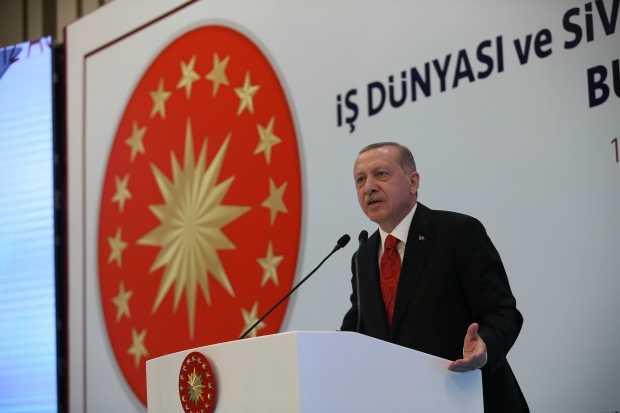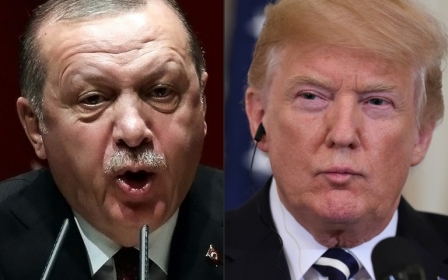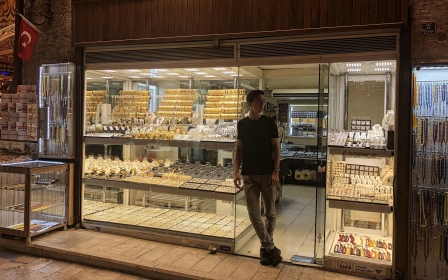Erdogan rails against US influence as lira pulls back from record low
ANKARA - As the Turkish lira pulled back from an overnight record low, President Recep Tayyip Erdogan accused the US of seeking to stab his country in the back and promised the currency would return to "rational" levels.
Recovering from a dangerous tailspin, the lira rose from 7.24 against the dollar in Asia Pacific trade on Monday morning after Turkey's central bank pledged to provide liquidity and cut lira and foreign currency reserve requirements for Turkish banks.
However, Erdogan, who has blamed his country's economic woes on foreign interference, said he expected attacks on the economy to continue.
The currency has lost more than 45 percent of its value this year over worries about Erdogan's influence over the economy, his repeated calls for lower interest rates in the face of high inflation, and worsening ties with the United States.
The president, who has called himself the "enemy of interest rates", wants cheap credit from banks to fuel growth, but investors fear the economy is overheating and could be set for a hard landing.
The crisis has been precipitated by an intense souring of relations between Washington and Ankara, with Turkey's jailing of a US pastor and purchase of Russian air defence systems, as well as America's refusal to extradite a Turkish cleric accused of plotting a coup, driving a wedge between the NATO allies.
New measures
In a statement released early Monday, the central bank promised to provide banks with "additional liquidity", and said it "will closely monitor the market depth and price formations, and take all necessary measures to maintain financial stability, if deemed necessary".
One of the measures to be implemented by Turkey's central bank is cutting the lira's reserve requirement ration, a cash buffer held by banks, by 250 points for all maturity brackets and lowered reserve requirement ratios for non-core FX liabilities by 400 basis points for maturities up to three years.
'This will positively affect the Turkish lira, but these are only short-term solutions. In the longer term, they have to take other decisions to solve the problems'
- Ercan Uysal, independent economist
These moves will free up 10 billion lira, $6 billion and $3 billion equivalent of gold liquidity in the financial system, the bank said.
Ercan Uysal, an independent economist, told Middle East Eye that the central bank's measures are positive steps - in the short term at least.
"The steps and announcements by the central bank and the treasury and finance ministry aim to relax the liquidity and the banking system in the short term, and I believe these measures will help to slow down the lira’s plunging," he said.
"This will positively affect the Turkish lira, but these are only short-term solutions. In the longer term, they have to take other decisions to solve the problems on economy and foreign policy."
Anger and treason
On Friday, US President Donald Trump announced the US was doubling tarriffs on steel and aluminium, two key goods for Turkey.
In his speech at a conference in Ankara on Monday, Erdogan railed against NATO ally Washington.
"You act on one side as a strategic partner but on the other you fire bullets into the foot of your strategic partner," he said.
"We are together in NATO and then you seek to stab your strategic partner in the back. Can such a thing be accepted?"
There were reassuring words from Erdogan, too.
"It is not at all like we sank and we are finished. The dynamics of the Turkish economy are solid, strong and sound and will continue to be so," Erdogan said.
A statement issued by the Capital Market's Board of Turkey told economists and analysts to refrain from commenting to the press.
"According to the provisions of the Capital Market's Board of Turkey, we will take all the necessary legal actions on those who give and spread wrong and misleading information and comments about the banks, financial corporations and companies," the statement said.
For its part, the Turkish interior ministry said it would take legal action against social media posts on the dollar-lira exchange rate that give a negative impression of the economy.
The ministry said 346 accounts that have posted "in a provocative way" on the exchange rate have been identified since 7 August, and will be dealt with by legal action.
Record low
The bank's announcement comes a day after Turkey's Finance Minister Berat Albayrak said the Turkish government had an action plan to ease investor concerns after the lira plunged to a record low in early Asia Pacific trade.
In an interview with Hurriyet newspaper published online, Albayrak described the lira's weakness as “an attack”, echoing Erdogan - who is his father-in-law - but he said Turkey’s action plan was ready.
"From Monday morning onwards our institutions will take the necessary steps and will share the announcements with the market," Albayrak said, without giving details on what the steps would be.
Albayrak also said a plan has been prepared for banks and the real economy sector, including small to mid-sized businesses, which are most affected by the foreign exchange fluctuations. "We will be taking the necessary steps with our banks and banking watchdog in a speedy manner," he said.
He has dismissed any suggestions that Turkey might intervene in dollar-denominated bank accounts, saying any seizure or conversion of those deposits into lira was out of the question.
Aggravated allies
Erdogan has warned the US that Turkey would seek new friends and allies as it looked for help to halt a full-blown currency crisis that has been made worse by an intensifying row with its NATO ally.
On Sunday, speaking to supporters in Trabzon on the Black Sea coast, Erdogan dismissed suggestions that Turkey was in a financial crisis like those seen in Asia two decades ago.
He said the crash of the lira, sparked by his bitter dispute with the US, was a "political plot" against Turkey and warned that Ankara would now seek new markets and partners, AFP reported.
The dispute between the two NATO allies - which reached new intensity over the detention of American pastor Craig Brunson in Turkey - has hammered the lira and also raised questions over the future partnership between Washington and Ankara.
"The aim of the operation is to make Turkey surrender in all areas, from finance to politics," Erdogan said. "We are once again facing a political, underhand plot. With God's permission we will overcome this," he added.
Ozgur Unluhisarcikli, director of German Marshall Fund of the Unites States think tank’s Turkey office, told Middle East Eye that Erdogan is unlikely to back down, despite the economic respite a detente with the US could provide.
"Erdogan has taken this issue [Brunson] as a matter of national pride. He also closed all the doors for any step back. And with Trump’s stance, Erdogan now has no chance for any honourable way out of this crisis," he said.
"From now on, if Turkey takes a unilateral step back, it would be a loss. Now, a solution is only possible if there will be a detailed package for a deal" over Brunson's release in return for economic aid, he added.
"If Turkey releases Brunson in return for an economic solution, Erdogan would be able to declare this as a victory to the Turkish people."
Reuters and AFP contributed to this report
New MEE newsletter: Jerusalem Dispatch
Sign up to get the latest insights and analysis on Israel-Palestine, alongside Turkey Unpacked and other MEE newsletters
Middle East Eye delivers independent and unrivalled coverage and analysis of the Middle East, North Africa and beyond. To learn more about republishing this content and the associated fees, please fill out this form. More about MEE can be found here.





